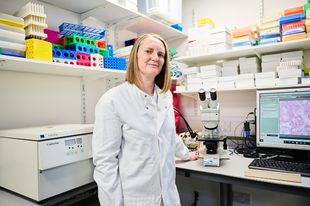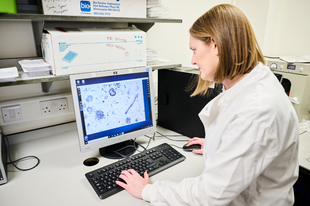A long-term goal is won day by day.
In the relentless fight against ovarian cancer, every day presents new challenges and new opportunities for breakthroughs. Dr. Paula Cunnea shows this dedication every day through her groundbreaking research, made possible by your support. Her work is not just about understanding the disease, but about finding ways to outsmart it.

Dr Paula Cunnea
Hello, I’m Dr. Paula Cunnea, and every day I wake up determined to make a difference in the fight against ovarian cancer. This disease is relentless, but so is our team.
In the lab, we face challenges head-on. Our research is not just about data and experiments; it’s about people. Every tumour sample represents a woman’s story and her hope.
After starting my research career at the Karolinska Institute in Sweden, I joined the Ovarian Cancer Action Research Centre in 2012, where I’ve been deeply involved in projects that strive to improve outcomes for women with ovarian cancer. Our team is committed to every part of this fight, from early detection and diagnosis to creating new treatments and tackling chemotherapy resistance.
Personalised treatment should be a necessity, not a luxury.
One of our most critical projects I’m working on involves trying to understand the most common type of ovarian cancer (high-grade serous carcinoma or HGSC). HGSC typically responds well to chemotherapy initially, but it almost always recurs, often spreading throughout the abdomen. And when it spreads, it changes too.
This means that when doctors analyse only one tumour sample to help treatment decisions, they are probably missing vital information.
So how do we design better treatments? How do we ensure each woman gets the right therapy for her specific cancer?

Dr Paula Cunnea
In our initial study of over 40 women, we found that 1 in 5 had variable test results across multiple tumours, suggesting they might not be receiving the most effective drugs.
Fundamentally, this means that personalised treatment should be a necessity, not a luxury. Each woman’s cancer is unique, and her treatment should reflect that.
We are about 18 months into this five-year project and are currently still collecting and analysing samples. Although we are still in the early stages, the potential impact of our findings could be enormous. By understanding how tumour samples can vary within a single person’s cancer, we can tailor treatments more accurately, improve survival rates, and enhance the quality of life for many women.
There’s a huge amount of hope in this research.
Every day is different, filled with unique challenges and opportunities. It’s not just the hope that our research will improve the outlook for patients and their families; it’s also the daily inspiration from our dedicated team.
Working with brilliant scientists, like Professor Christina Fotopoulou, and seeing the real progress we make together is truly motivating. Whether we are planning experiments, analysing data, or preparing grants for future funding, the goal is always the same: to make a real difference in the fight against ovarian cancer.
Your belief in our work gives us the strength to keep pushing forward. Thank you.